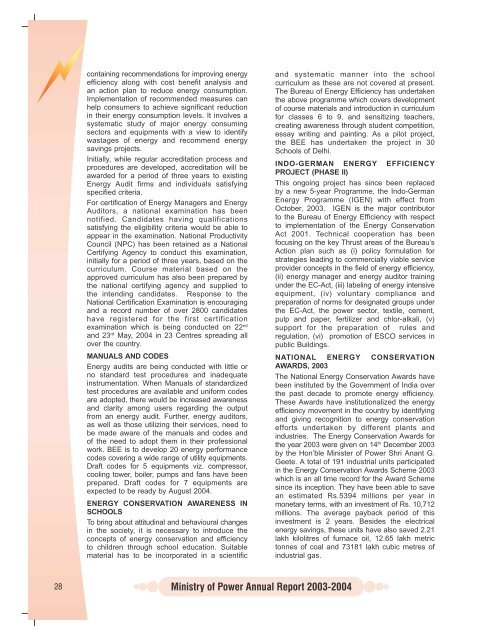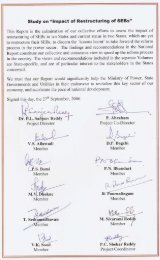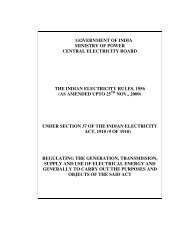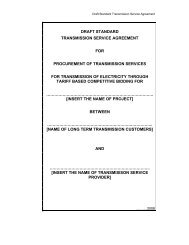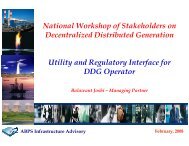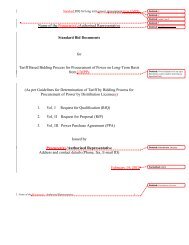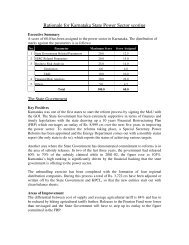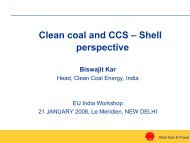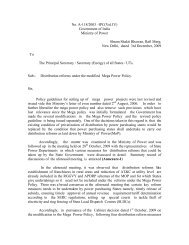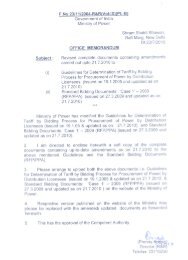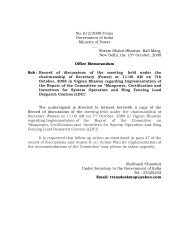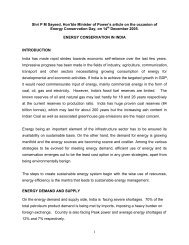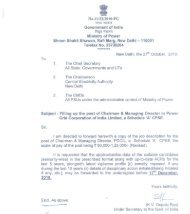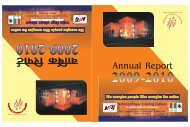Untitled - Ministry of Power
Untitled - Ministry of Power
Untitled - Ministry of Power
Create successful ePaper yourself
Turn your PDF publications into a flip-book with our unique Google optimized e-Paper software.
28<br />
containing recommendations for improving energy<br />
efficiency along with cost benefit analysis and<br />
an action plan to reduce energy consumption.<br />
Implementation <strong>of</strong> recommended measures can<br />
help consumers to achieve significant reduction<br />
in their energy consumption levels. It involves a<br />
systematic study <strong>of</strong> major energy consuming<br />
sectors and equipments with a view to identify<br />
wastages <strong>of</strong> energy and recommend energy<br />
savings projects.<br />
Initially, while regular accreditation process and<br />
procedures are developed, accreditation will be<br />
awarded for a period <strong>of</strong> three years to existing<br />
Energy Audit firms and individuals satisfying<br />
specified criteria.<br />
For certification <strong>of</strong> Energy Managers and Energy<br />
Auditors, a national examination has been<br />
notified. Candidates having qualifications<br />
satisfying the eligibility criteria would be able to<br />
appear in the examination. National Productivity<br />
Council (NPC) has been retained as a National<br />
Certifying Agency to conduct this examination,<br />
initially for a period <strong>of</strong> three years, based on the<br />
curriculum. Course material based on the<br />
approved curriculum has also been prepared by<br />
the national certifying agency and supplied to<br />
the intending candidates. Response to the<br />
National Certification Examination is encouraging<br />
and a record number <strong>of</strong> over 2800 candidates<br />
have registered for the first certification<br />
examination which is being conducted on 22nd and 23rd May, 2004 in 23 Centres spreading all<br />
over the country.<br />
MANUALS AND CODES<br />
Energy audits are being conducted with little or<br />
no standard test procedures and inadequate<br />
instrumentation. When Manuals <strong>of</strong> standardized<br />
test procedures are available and uniform codes<br />
are adopted, there would be increased awareness<br />
and clarity among users regarding the output<br />
from an energy audit. Further, energy auditors,<br />
as well as those utilizing their services, need to<br />
be made aware <strong>of</strong> the manuals and codes and<br />
<strong>of</strong> the need to adopt them in their pr<strong>of</strong>essional<br />
work. BEE is to develop 20 energy performance<br />
codes covering a wide range <strong>of</strong> utility equipments.<br />
Draft codes for 5 equipments viz. compressor,<br />
cooling tower, boiler, pumps and fans have been<br />
prepared. Draft codes for 7 equipments are<br />
expected to be ready by August 2004.<br />
ENERGY CONSERVATION AWARENESS IN<br />
SCHOOLS<br />
To bring about attitudinal and behavioural changes<br />
in the society, it is necessary to introduce the<br />
concepts <strong>of</strong> energy conservation and efficiency<br />
to children through school education. Suitable<br />
material has to be incorporated in a scientific<br />
and systematic manner into the school<br />
curriculum as these are not covered at present.<br />
The Bureau <strong>of</strong> Energy Efficiency has undertaken<br />
the above programme which covers development<br />
<strong>of</strong> course materials and introduction in curriculum<br />
for classes 6 to 9, and sensitizing teachers,<br />
creating awareness through student competition,<br />
essay writing and painting. As a pilot project,<br />
the BEE has undertaken the project in 30<br />
Schools <strong>of</strong> Delhi.<br />
INDO-GERMAN ENERGY EFFICIENCY<br />
PROJECT (PHASE II)<br />
This ongoing project has since been replaced<br />
by a new 5-year Programme, the Indo-German<br />
Energy Programme (IGEN) with effect from<br />
October, 2003. IGEN is the major contributor<br />
to the Bureau <strong>of</strong> Energy Efficiency with respect<br />
to implementation <strong>of</strong> the Energy Conservation<br />
Act 2001. Technical cooperation has been<br />
focusing on the key Thrust areas <strong>of</strong> the Bureau’s<br />
Action plan such as (i) policy formulation for<br />
strategies leading to commercially viable service<br />
provider concepts in the field <strong>of</strong> energy efficiency,<br />
(ii) energy manager and energy auditor training<br />
under the EC-Act, (iii) labeling <strong>of</strong> energy intensive<br />
equipment, (iv) voluntary compliance and<br />
preparation <strong>of</strong> norms for designated groups under<br />
the EC-Act, the power sector, textile, cement,<br />
pulp and paper, fertilizer and chlor-alkali, (v)<br />
support for the preparation <strong>of</strong> rules and<br />
regulation, (vi) promotion <strong>of</strong> ESCO services in<br />
public Buildings.<br />
NATIONAL ENERGY CONSERVATION<br />
AWARDS, 2003<br />
The National Energy Conservation Awards have<br />
been instituted by the Government <strong>of</strong> India over<br />
the past decade to promote energy efficiency.<br />
These Awards have institutionalized the energy<br />
efficiency movement in the country by identifying<br />
and giving recognition to energy conservation<br />
efforts undertaken by different plants and<br />
industries. The Energy Conservation Awards for<br />
the year 2003 were given on 14 th December 2003<br />
by the Hon’ble Minister <strong>of</strong> <strong>Power</strong> Shri Anant G.<br />
Geete. A total <strong>of</strong> 191 industrial units participated<br />
in the Energy Conservation Awards Scheme 2003<br />
which is an all time record for the Award Scheme<br />
since its inception. They have been able to save<br />
an estimated Rs.5394 millions per year in<br />
monetary terms, with an investment <strong>of</strong> Rs. 10,712<br />
millions. The average payback period <strong>of</strong> this<br />
investment is 2 years. Besides the electrical<br />
energy savings, these units have also saved 2.21<br />
lakh kilolitres <strong>of</strong> furnace oil, 12.65 lakh metric<br />
tonnes <strong>of</strong> coal and 73181 lakh cubic metres <strong>of</strong><br />
industrial gas.


